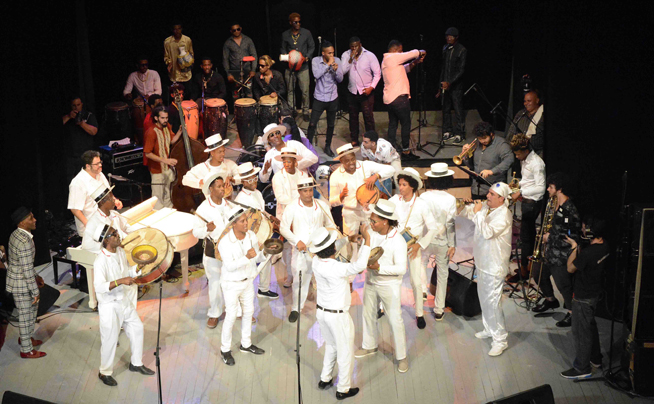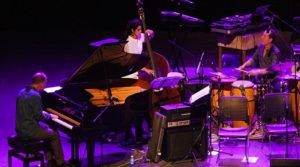 EL ‘JAZZ’ EXPLOTA TRIUNFALMENTE DE REGRESO A CUBA.
EL ‘JAZZ’ EXPLOTA TRIUNFALMENTE DE REGRESO A CUBA.
Hace décadas que el jazz trascendió las fronteras de Estados Unidos, donde surgió como género musical en la segunda mitad del siglo XIX. Hoy es un lenguaje universal que convida y acoge a los más diversos exponentes y expresiones en un diálogo común que tiene como epicentro por estos días su regreso a Cuba.
La celebración esta semana de la 34 edición del Festival Internacional Jazz Plaza 2019 confirma el hecho, y destaca un movimiento musical que se asentó en esta isla en los años 60 de la pasada centuria cuando se le consideró un género extranjerizante mal visto entonces.
En esta oportunidad, intérpretes de Estados Unidos, Puerto Rico, Australia, Argentina, Canadá, Suiza, Alemania, Uruguay, Japón, Noruega, Gran Bretaña, Ecuador, Colombia y España se unieron a artistas cubanos, e imprimieron intensidad a los cerca de 100 conciertos y descargas programadas en la cita.
Desde el 14 de enero pasado y hasta el domingo 20, La Habana y la oriental ciudad de Santiago de Cuba fueron las sedes de un evento que a través del tiempo ha ganado prestigio internacional. Una decena de teatros, salas de concierto y espacios públicos fueron los lugares a los que acudieron centenares de locales y visitantes foráneos atraídos por una corriente cuyo impacto en la música cubana es palpable.
Por esa razón, la presente edición se vincula estrechamente con la rumba, la música popular bailable y los géneros alternativos, “vivos ejemplos de la importancia e influencias del jazz dentro del panorama cubano”, consideró recientemente Víctor Rodríguez, presidente del Jazz Plaza.
Por su parte, Bobby Carcassés, uno de los “showmen” más relevantes de la isla y principal gestor de estos encuentros, resaltó el hecho de que el festival esté dedicado a la música cubana y muestre el talento local, así como la calidad y autenticidad del jazz cubano.
En declaraciones a medios de prensa, el Premio Nacional de Música 2012 valoró los aportes realizados por la percusión y sonoridad autóctonas de esta nación, mezcla de las raíces africanas y caribeñas que han sido invaluables y produjeron, incluso, el surgimiento del Latin Jazz, una nueva corriente que mucho ha contribuido al género.
Precisamente uno de sus máximos exponentes es el pianista cubano, Chucho Valdés, ganador de nueve premios Grammy, para quien el jazz es un “lenguaje común” donde confluyen esencias, identidades y la filosofía de libertad, máxima que acompaña al festival, motivos por los cuales el poder de convocatoria del Jazz Plaza aumenta cada año, un reflejo de la pasión de los cubanos por un género que han hecho suyo hoy.
Además, muestra el interés de creadores y públicos de todo el orbe por disfrutar y apreciar la forma en que esta isla concibe y vive el jazz.
De acuerdo con Roberto Fonseca, uno de los organizadores de la cita, cada vez más músicos extranjeros del más alto nivel acuden al evento, como es el caso del pianista cubano-americano Arturo O’ Farrill.
También resaltan la joven estrella del soul, la británica Joscelyn Eve Stoker, más conocida como Joss Stone; los norteamericanos Dennis Chambers (baterista); Jeff Berlin (bajista), Yosvany Terry (saxofón), Dick Griffin (trombón) y los multi-instrumentistas David Sancious y Roger Glenn. Asimismo, participaron otros músicos de renombre internacional como el guitarrista israelí Oz Noy, la cantante española Patricia Kraus y los australianos Dan Barnett (trompeta) y Emma Pask (vocalista).
Dentro de los temas presentados al Festival fueron esos temas que destacaron la relación entre el jazz y la industria musical en Cuba, sus nexos con la música electrónica y la academia, así como la proyección del género a nivel internacional y su capacidad para fusionarse con otras corrientes y exponentes de diferentes latitudes. Así lo destacó el popular músico cubano Giraldo Piloto, para quien el festival es también una expresión de la madurez e impronta del movimiento jazzístico contemporáneo en la isla, que cada vez adquiere más fuerza dentro del país e irradia al resto del mundo.
“Cada año aprovechamos este evento porque espacios como el Jazz Plaza permiten no sólo rescatar las tradiciones musicales sino redescubrir otras maneras de hacer, lo cual el público siempre agradece”, afirmó el baterista, arreglista y director de la agrupación Klímax.
El Festival Internacional Jazz Plaza es uno de los acontecimientos musicales más esperados en el amplio panorama cultural cubano; surgió en el año 1980 a partir de una serie de encuentros organizados por el “showman” Bobby Carcassés. Actualmente, se realiza con carácter anual y es organizado por el Centro Nacional de Música Popular de esta nación caribeña.
Desde sus primeras ediciones, ha propiciado el intercambio entre jóvenes y consagrados representantes del jazz cubano y foráneo, al tiempo que sirve de plataforma para lanzar a los nuevos talentos del género de la isla.
 THE ‘JAZZ’ EXPLODES TRIUMPHANTLY IN ITS RETURN TO CUBA.
THE ‘JAZZ’ EXPLODES TRIUMPHANTLY IN ITS RETURN TO CUBA.
For decades, jazz has transcended the borders of the United States, where it emerged as a musical genre in the second half of the 19th century. Today is a universal language that invites and welcomes the most diverse exponents and expressions in a common dialogue that has as its epicenter these days its return to Cuba.
This week’s celebration of the 34th edition of the International Jazz Plaza 2019 Festival confirms the fact, and highlights a musical movement that settled on this island in the 60s of the last century when it was considered a foreign genre badly seen then.
On this occasion, interpreters from the United States, Puerto Rico, Australia, Argentina, Canada, Switzerland, Germany, Uruguay, Japan, Norway, Great Britain, Ecuador, Colombia and Spain joined Cuban artists, and printed intensity to the nearly 100 concerts and downloads scheduled at the appointment.
From January 14 and until Sunday 20, Havana and the eastern city of Santiago de Cuba were the venues of an event that has gained international prestige over time. A dozen theaters, concert halls and public spaces were the places to which hundreds of locals and foreign visitors came, attracted by a current whose impact on Cuban music is palpable.
For this reason, this edition is closely linked to rumba, popular dance music and alternative genres, “living examples of the importance and influences of jazz within the Cuban scene,” said Víctor Rodríguez, president of Jazz Plaza.
For his part, Bobby Carcassés, one of the most important showmen of the island and the main manager of these meetings, highlighted the fact that the festival is dedicated to Cuban music and shows local talent, as well as quality and authenticity of Cuban jazz.
Speaking to the media, the National Music Prize 2012 valued the contributions made by the native percussion and sound of this nation, a mixture of African and Caribbean roots that have been invaluable and even produced the emergence of Latin Jazz, a new current that much has contributed to the genre.
Precisely one of its greatest exponents is the Cuban pianist, Chucho Valdés, winner of nine Grammy awards, for whom jazz is a “common language” where essences, identities and philosophy of freedom converge, the maxim that accompanies the festival, reasons for the which the power to summon the Jazz Plaza increases each year, a reflection of the passion of Cubans for a genre that they have made theirs today.
In addition, it shows the interest of creators and audiences around the world to enjoy and appreciate the way in which this island conceives and lives jazz.
According to Roberto Fonseca, one of the organizers of the event, more and more foreign musicians of the highest level attend the event, as is the case of the Cuban-American pianist Arturo O ‘Farrill.
They also highlight the young soul star, the British Joscelyn Eve Stoker, better known as Joss Stone; Americans Dennis Chambers (drummer); Jeff Berlin (bassist), Yosvany Terry (saxophone), Dick Griffin (trombone) and multi-instrumentalists David Sancious and Roger Glenn. Other internationally renowned musicians also participated, such as Israeli guitarist Oz Noy, Spanish singer Patricia Kraus and Australians Dan Barnett (trumpet) and Emma Pask (vocalist).
Among the themes presented at the Festival were those themes that highlighted the relationship between jazz and the music industry in Cuba, its links with electronic music and academia, as well as the projection of the genre internationally and its ability to merge with other currents and exponents of different latitudes. This was highlighted by the popular Cuban musician Giraldo Piloto, for whom the festival is also an expression of the maturity and imprint of the contemporary jazz movement on the island, which is gaining strength within the country and radiates to the rest of the world.
“Every year we take advantage of this event because spaces like the Jazz Plaza allow us not only to rescue the musical traditions but to rediscover other ways of doing, which the public always appreciates,” said the drummer, arranger and director of the Klímax group.
The Jazz Plaza International Festival is one of the most anticipated musical events in the broad Cuban cultural scene; It arose in the year 1980 from a series of meetings organized by the “showman” Bobby Carcassés. Currently, it is held on an annual basis and is organized by the National Center for Popular Music of this Caribbean nation.
Since its first editions, it has promoted the exchange between young and consecrated representatives of Cuban and foreign jazz, while serving as a platform to launch the new talents of the genre of the island.
Agencies/ Xinhua, La Habana/ Noemí Galbán/ Extractos/ Internet Photos/ YouTube/ Arnoldo Varona/ www.TheCubanHistory.com
THE CUBAN HISTORY, HOLLYWOOD.













